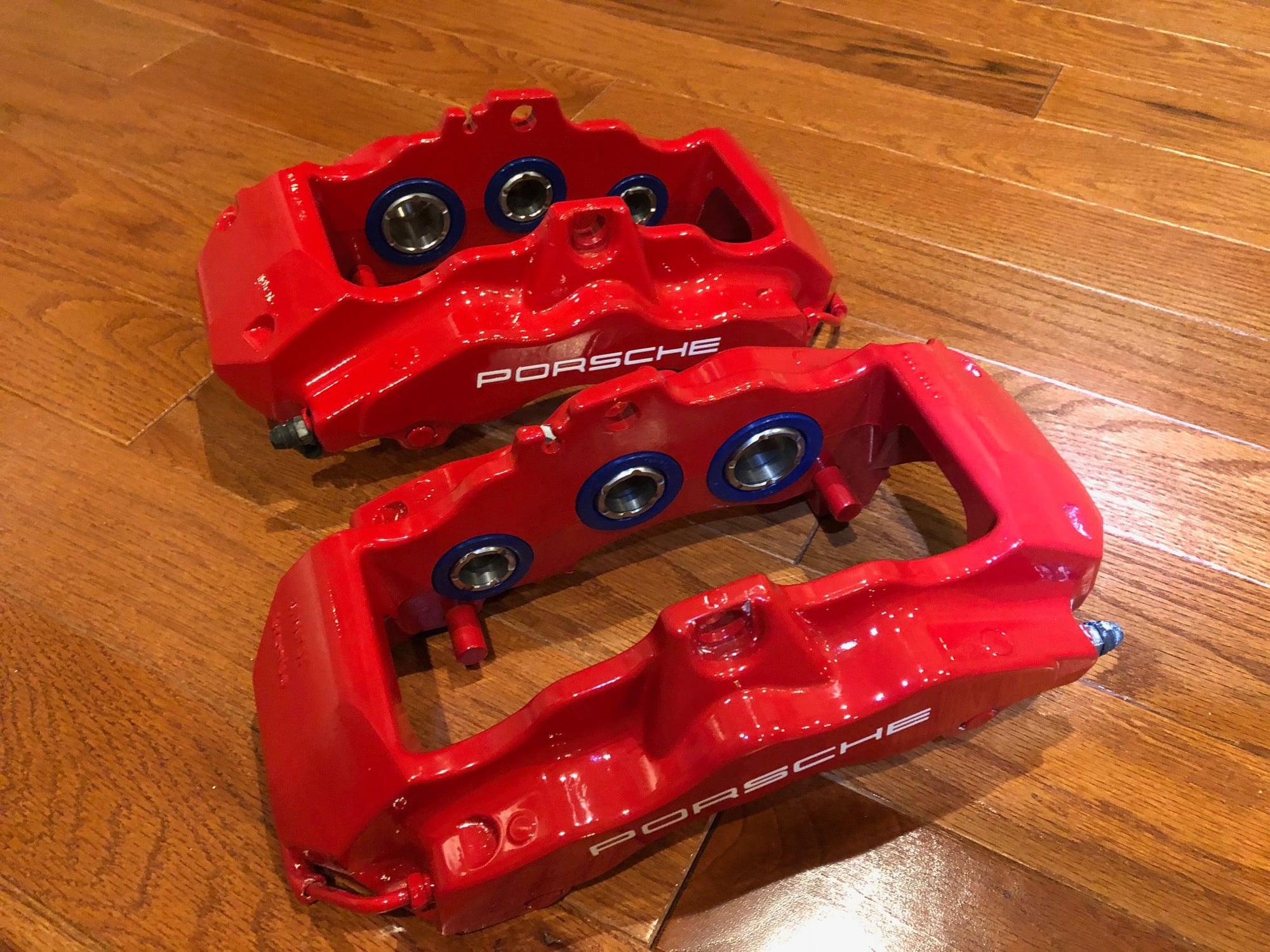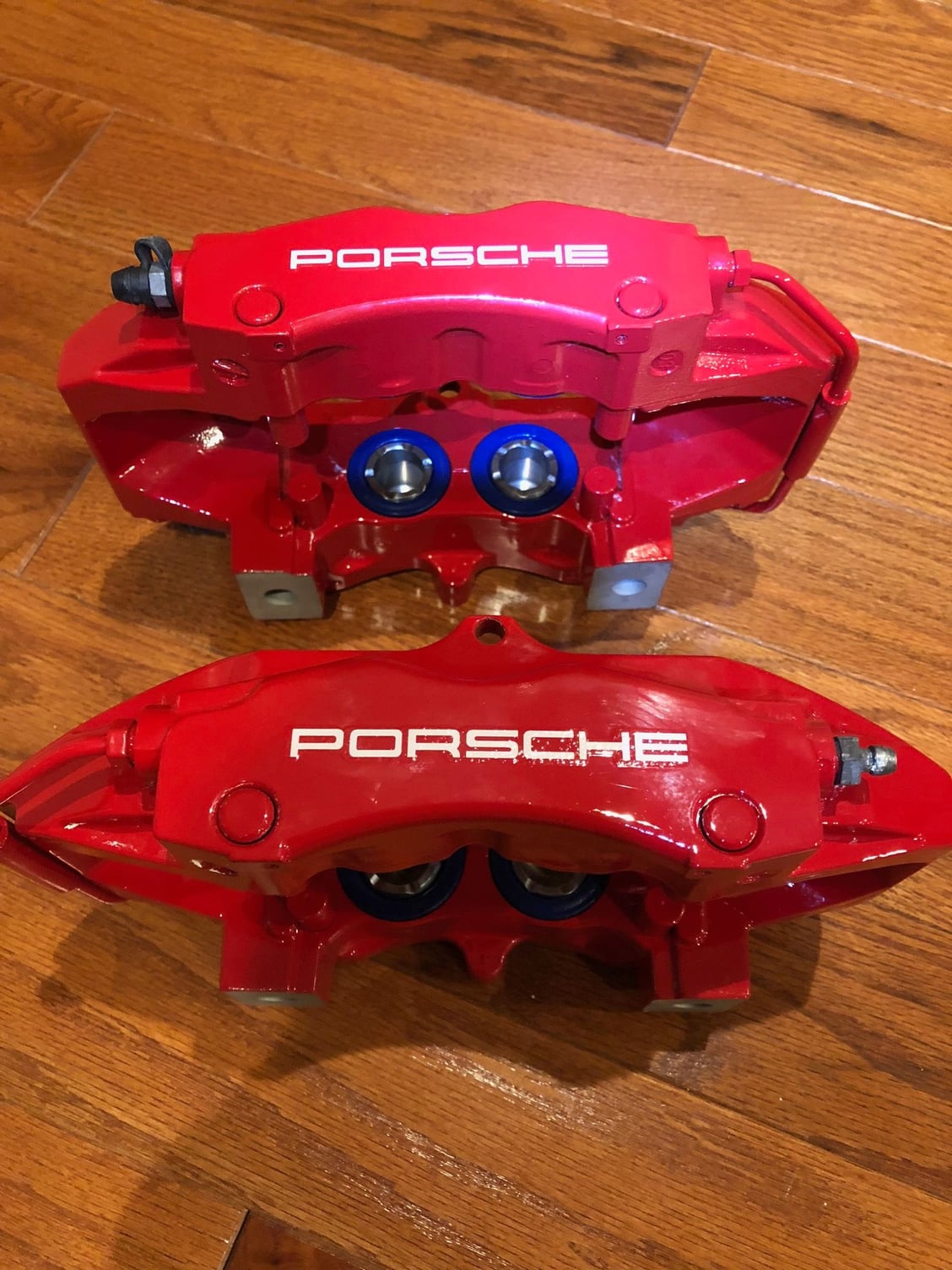Brake Caliper Rebuild - stainless pistons vs. aluminum?
#61
I would guess the main main reason is cost. Of course if you put the wrong size piston in then it will be problematic regardless of the material used, but that is not a reason for a manufacturer to chose not to use SS. Presumably any manufacturer that knows what it’s doing would spec the correct size pistons.
#62
Rennlist Member
#63
Rennlist Member
I had them repainted by Wheel Dynamics in CA - very happy with their work - last time I tried painting calipers I almost ruined our new kitchen granite top...so caliper painting is now banned in my household...😬
#64
Rennlist
Basic Site Sponsor
Basic Site Sponsor
I had to laugh because I cleaned some car parts in the dish washer; That was a couch night...
__________________
*Coming soon high temperature dust boots and piston seals!
Ohio Clothing
www.ohioperformancesolutions.com
2007 C4S F77 Aerokit / 2004 E46 M3 / 2018 M3 comp
Ohio Clothing
www.ohioperformancesolutions.com
2007 C4S F77 Aerokit / 2004 E46 M3 / 2018 M3 comp
#65
Technical Guru
Rennlist Member
Rennlist Member
The difference in cost is trivial, especially with some of the racing calipers. Or do the marketed and actual real world benefits not justify even the minor cost differences? A non-technical reason just doesn't seem to be the entire story.
#66
I don't know what the actual cost differences are, but I am not aware of any calipers that are designed for racing that use aluminum pistons. Generally you see stainless pistons in those, and sometimes titanium if cost is not a factor. For example when you look at the calipers AP Racing makes for big brake kits that they market for street cars those use aluminum pistons, but their racing calipers uses stainless or titanium. Same with Brembo as far as I am aware. Shoot an email to Jeff Ritter at Essex Racing if you really want a definitive explanation though. He knows more about the aftermarket brakes industry than anyone on this forum and has answered a number of questions from members with very comprehensive and well-informed responses. I am answering based on my limited knowledge of these issues based on what I have read and seen.
#67
I don't know what the actual cost differences are, but I am not aware of any calipers that are designed for racing that use aluminum pistons. Generally you see stainless pistons in those, and sometimes titanium if cost is not a factor. For example when you look at the calipers AP Racing makes for big brake kits that they market for street cars those use aluminum pistons, but their racing calipers uses stainless or titanium. Same with Brembo as far as I am aware. Shoot an email to Jeff Ritter at Essex Racing if you really want a definitive explanation though. He knows more about the aftermarket brakes industry than anyone on this forum and has answered a number of questions from members with very comprehensive and well-informed responses. I am answering based on my limited knowledge of these issues based on what I have read and seen.
So if one wants an OEM caliper cracking puck solution with ~equal or better thermal properties to the stock aluminum + ceramic insulator design, you only have two options currently
1) the AutoQuest titanium replacement pucks, or
2) the RacingBrake stainless pistons
It seems to me that straight aluminum pistons would be a step backwards in heat transmission to the fluid on heavily tracked cars... (aluminum StopTech piston shown below)

#68
Rennlist
Basic Site Sponsor
Basic Site Sponsor
News to me: the StopTech drop-in replacement pistons for the OEM GT3 calipers are anodized aluminum (not stainless steel). Was very surprised by this...
So if one wants an OEM caliper cracking puck solution with ~equal or better thermal properties to the stock aluminum + ceramic insulator design, you only have two options currently
1) the AutoQuest titanium replacement pucks, or
2) the RacingBrake stainless pistons
It seems to me that straight aluminum pistons would be a step backwards in heat transmission to the fluid on heavily tracked cars... (aluminum StopTech piston shown below)
So if one wants an OEM caliper cracking puck solution with ~equal or better thermal properties to the stock aluminum + ceramic insulator design, you only have two options currently
1) the AutoQuest titanium replacement pucks, or
2) the RacingBrake stainless pistons
It seems to me that straight aluminum pistons would be a step backwards in heat transmission to the fluid on heavily tracked cars... (aluminum StopTech piston shown below)
#70
We were amazed also. I also want some concrete evidence of the thermal barrier properties of the SS vs other options. I will be utilizing a local engineering university to do some testing and will let the results determine the best outcome. I tell you we have been dead wrong before. The hard part is getting a (quality) machine shop that uses good USA made SS; (our last place went out of business) - Seems as though the pucks are an option in titanium also. We have had good luck in our cars running titanium pad shields as a low cost option; I'm unsure if there is even a demand for those. The issue is they are noisy as hell off the track! hmmm - so many questions.
#71
We were amazed also. I also want some concrete evidence of the thermal barrier properties of the SS vs other options. I will be utilizing a local engineering university to do some testing and will let the results determine the best outcome. I tell you we have been dead wrong before. The hard part is getting a (quality) machine shop that uses good USA made SS; (our last place went out of business) - Seems as though the pucks are an option in titanium also. We have had good luck in our cars running titanium pad shields as a low cost option; I'm unsure if there is even a demand for those. The issue is they are noisy as hell off the track! hmmm - so many questions.
.jpg)
Stock aluminum pistons w/ ceramic pucks
- 10 mm of ceramic, 26 mm diameter, thermal conductivity of 10 W/m*K
- 10 mm of aluminum until you hit substantial fluid, 30 mm diameter, assume 2024-T6 w/ thermal conductivity of 177 W/m*K (most aluminum is higher [worse] conductivity)
- TOTAL thermal conductance: 0.51 Watts/Kelvin

Hollow aluminum piston (similar to StopTech piston design)
- 8 mm of thinner top portion of piston, 22 mm outer diameter and 14.4 mm inner diameter, thermal conductivity of 177 W/m*K
- 12 mm of main piston body until you hit substantial fluid, 30 mm diameter, 14.4 mm inner diameter, thermal conductivity of 177 W/m*K
- TOTAL thermal conductance: 3.00 Watts/Kelvin

Hollow 304 stainless steel piston (similar to RacingBrake piston design)
- 8 mm of thinner top portion of piston, 28 mm outer diameter and 20 mm inner diameter, thermal conductivity of 16 W/m*K
- 12 mm of main piston body until you hit substantial fluid, 30 mm diameter, 22 mm inner diameter, thermal conductivity of 16 W/m*K
- TOTAL thermal conductance: 0.25 Watts/Kelvin
Relative numbers:
- The hollow aluminum pistons have 5.9 times HIGHER thermal conductance than stock
- The hollow stainless pistons have 2.0 times LOWER thermal conductance than stock
- The hollow stainless pistons have 11.9 times LOWER thermal conductance than the hollow aluminum pistons
I didn't bother calculating the titanium puck option because the exact titanium allow is unknown. Suffice to say that the range of titanium conductivities overlap with the ceramic conductivities, so in my opinion the "Stock" calculation is a good representation of the titanium puck versions. A complete hollow titanium piston would be a different story of course.
Conclusion:
- The hollow aluminum pistons have dramatically higher thermal conductance than the stock ceramic puck-based pistons. If you want to reduce heat transmission from the pads into the fluid but need to replace your broken stock ceramic pucks, the lowest thermal conductance options are the replacement titanium pucks (similar to stock), or the stainless steel pistons (better than stock).
Last edited by Mech33; 09-24-2018 at 10:43 PM.
#72
Rennlist Member
As an update my RB rebuilt calipers with seals/boots and SS pistons held up well - I opted for the normal temp boots which lasted 3500 track mikes on the front of my dedicated 996 GT3 track car. They still felt great but I noticed the boots on pad change. I rebuilt a second set of front calipers with the SS pistons/ seals and high temp dust boots - they’re now on, so I will be able to directly compare how much longer they will last. I’m very pleased with the RB products and have ordered a replacement set of seals and high temp boots for my original calipers to refresh them
#73
Former Vendor
Hello Porsche track racers, I think here might be a good place to share with some of you who have switched to AP brake kit.
The initial release is for the seal and boot kit only with an ETA in early October.
This post simply to offer Porsche owners with an alternative choice, by no means to question AP calipers' quality or durability; as components replacement is normal and essential to keep your caliper in top shape - as suggested by AP/Essex.
- Have you ever rebuilt AP calipers?
- Are they easy to source?
- Are their durability meets your expectation?
27.0mm
31.8
36.0
38.1
41.3 mm
Rest be assured the design and tooling on those non-metric seal & boots were taken from the original calipers with our insight and comparison test with Brembo (metric) calipers before the dimensions & tolerance are finalized.31.8
36.0
38.1
41.3 mm
The initial release is for the seal and boot kit only with an ETA in early October.
This post simply to offer Porsche owners with an alternative choice, by no means to question AP calipers' quality or durability; as components replacement is normal and essential to keep your caliper in top shape - as suggested by AP/Essex.
Brake Caliper, Seals & Temperature
Because race brake calipers are sometimes subjected to very high and unpredictable operating temperatures, they must be examined and seals must be replaced on a regular basis to maintain efficiency and safety. Seal life is governed by time at temperature which should therefore be kept as low as possible by provision of cooling airflow. For guidance only AP Racing offer the following recommendations (temperatures measured on outside of caliper adjacent to logo): - Calipers that regularly run at up to 200°C - Re-seal every other event. - Calipers that run intermittently from 200°C to 220°C abd above - Re-seal as soon as possible. - Reduce "soak" temperatures after the car has come to rest where possible (e.g. do not leave foot on brake pedal when stationary with hot brakes) as this can cause excessive caliper temperatures.
#74
Rennlist
Basic Site Sponsor
Basic Site Sponsor
Very interested



